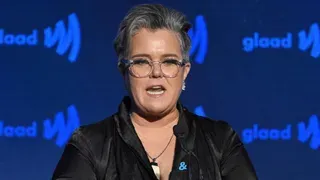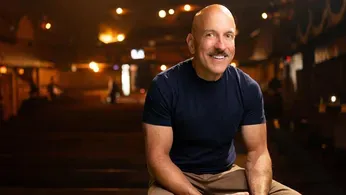
Apr 30
For the Cape Playhouse's Eric Rosen, Summer Stock is Theater Camp for Grown-ups
Nicholas Dussault READ TIME: 11 MIN.
The Cape Playhouse in Dennis, MA has been producing must-see theater for residents and visitors to Cape Cod for nearly a century. The legendary summer theater opened its doors in 1927 and quickly became the place "where Broadway goes to summer." Ingenues like Bette Davis and Jane Fonda appeared there long before they were household names. The legendary stage has also been graced by such notables as Henry Fonda, Angela Lansbury, Bernadette Peters, and, of course, Gertrude Lawrence, whose ghost is still believed to be in residence. If you don't put blue hydrangeas in her dressing room on opening night – watch out!
It's been nearly a year since EDGE chatted with Eric Rosen, the then-incoming artistic director of the Cape Playhouse. As he prepares to pack up his family and move to the Cape for another summer, EDGE had the chance to catch up with him about his first year, his upcoming season, and future plans for the Playhouse. This summer's program includes a brand-new play about another diva, the iconic Joan Rivers. Let's hope she and Gertie don't fight about the flowers in the dressing room. Joan prefers orchids.
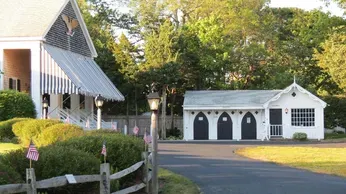
EDGE: It's been a year since we last spoke. How was your first season at the Playhouse?
Eric Rosen: It was really amazing. I remember when we spoke last year. I had not done it yet, and, to be honest, it's amazing to me to think that I walked onto that campus on June 1, when the season started, and I had only spent about ten nights on Cape Cod in my life, and had only three experiences at the Playhouse. I was suddenly thrown into this crazy rhythm. I'd never run a summer stock schedule before. Doing show after show after show is like being thrown deeply into the deep end, but you quickly realize just how fun it is. There's a reason these places have survived and thrived for generations. It's kind of like theater camp for grown-ups – my friends coming up and making shows. The pace of it was really fun.
EDGE: And you were a success.
Eric Rosen: The most exciting thing was that the audience response to what we did was extraordinary. We beat every goal by a lot. And there was a point about eight weeks into the season where you couldn't get a ticket. It always feels great to be selling out left and right. In my whole career, and I've been doing this for a couple of decades, I've never had the experience of show after show, hit after hit. It was really fun. It puts a lot of pressure on the next season, but I think we can do it again.
EDGE: Do you feel like you're part of the fabric there now?
Eric Rosen: The weird thing is, I was there non-stop for all this time and then I just left, came back to New York. You're in fast forward for 15 to 16 weeks and then we go into off-season mode. I left, everyone on the board left, the audience left. It'll be interesting to step back into it and see where we are. Do they remember me, or am I still the new guy?
The Cape is an interesting place. It goes from a very sleepy kind of rural place to vacation central for those few months, then back to being a quiet place. We did a concert there in December. My husband, Claybourne [Elder], did a show for us, and it was kind of fun to be back, having big crowds again. It was just a taste of what it'll be like this summer. I've only been there 10-12 days since the season ended. I'm working all the time, but from New York. [Editor's note: Claybourne Elder returns to the theater on Memorial Day weekend for a concert. For more information, visit the Cape Playhouse website.]
EDGE: Does the success of year one put any pressure on you for season two?
Eric Rosen: I don't think of it as pressure. I get very excited when I see opportunity and possibility. We blew past goals that I thought would take us a couple of years to get to. It gave me courage in terms of planning this coming season. It builds on that success, on what I learned, and it's paced a little more generously. It's not quite as insane as it was last summer, but I think with the show titles and the artists we're getting, it should all work again. I feel pretty confident in it, and advance sales suggest we're moving in the right direction.
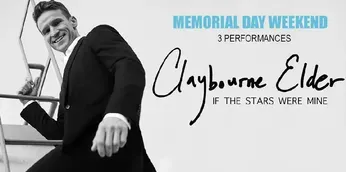
EDGE: Why are you calling it A Season of Hope?
Eric Rosen: I don't do a theme. I just look at what I'm interested in doing, what the audience is interested in, and some commonality. It's almost as if the planning process tells me what the theme is. There's a lot of challenge in these stories. There's a lot of adversity, but also a lot of optimism and stories that triumph over adversity. I didn't say, "Let's call it The Season of Hope," the marketing team did. But when I kept talking about this positive vision and this optimism, it felt like hope it is.
EDGE: So you don't come out and say, "This is the theme of the season, let's see what shows fit that theme"?
Eric Rosen: No, no, no. If I ever tried to do that, it would be the worst season ever.
EDGE: Can you walk me through the season?
Eric Rosen: We're starting with "The Buddy Holly Story." We have an amazing director, Meredith McDonough, who was actually my student at Northwestern a long time ago. She directed it before, and we talked about her doing it again. It really feeds on the success of, and nostalgia for, the Boomer era. We've seen tremendous success with "Jersey Boys" and "Beautiful." I wanted to find something that took our audience someplace they already knew, but through a different lens. The music's a bit earlier, but it has the same feeling of those shows. It feels like a good way to start in what is traditionally a very year-round-people audience. The people who come early in the season tend to be those who are on Cape for longer than their vacation.
EDGE: What's next?
Eric Rosen: I chose "RENT" because we had done "Tick, Tick... Boom" last season, and Jonathan Larson's connection to the Playhouse and the Cape is significant to us. Having introduced the audience to this voice, it felt like a great way to follow up would be to stage his masterpiece. It's the 30th anniversary of "RENT," so that felt significant to me.
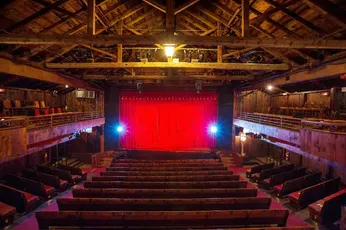
EDGE: What do you do to keep "RENT" fresh?
Eric Rosen: I think it's certainly now a period piece, though it's hard because it's my period. I was 23 when "RENT" happened. I don't think of it as being un-fresh, because it feels like it's my generation's story, and the struggles it portrays feel current. Young people facing an oppressive system that is not caring for them in the way it should, struggling with affordability and ways to survive an economic crisis, all feel really real. Of course, the themes of "RENT" are classic in its operatic scope. [It is loosely based on "La Boheme."] It feels grand, but also specific and period. I think it's worth doing, because how often do you get to see a live production of "RENT," really?
If you've ever been to the Playhouse, nostalgia is the gasoline of the place. It's rooted in history; you feel the ghosts. You feel Bette Davis and Henry Fonda staring over your shoulder. I had a conversation with a board member when I was interviewing for the job. He's in his late 80s. I asked him what makes [him] want to do this. He said, "I have my mother's seats." It took me a minute to realize he's literally sitting in the seats where his mother, who's probably long dead, sat when he was a child at the Playhouse. That's amazing to me. There's an unspoken ingredient, a connection to the past, that frames the experience differently than if City Center was doing "RENT." I'd probably be asking why. But doing it here feels vibrant and interesting in a way that it's putting it in its correct context now, as it has aged into classic status.
EDGE: Now that you've brought up the Playhouse history, have you met Gertrude?
Eric Rosen: I've had some moments. There's a lot of energy in that building. I'm not a supernaturalist, but I have been speaking to a guy called Stage Door Medium on Instagram, and he's been talking about the ghosts at the Playhouse. I'm thinking about bringing him in to do a night of a spiritualist take on the Playhouse. You definitely hear the fascinating stories, the lore. I never feel like I'm alone in that building. Any theater that I'm working in, or that I'm running, I usually find a place to hide so I can watch but not have to sit in the audience. I found this little corner behind the audience at the Playhouse where generations of apprentices have scrawled their names on the wall, and they go back 50, 60 years. It's not just the ghost of Gertrude Lawrence. Think of the lives that have been lived and touched and centered in that place. It just feels very present, but not scary.
EDGE: Did you put the flowers in her dressing room?
Eric Rosen: Blue hydrangeas every opening night, just in case. It's a nice tradition. And whenever things go wrong we say, "Gertie's mad."

EDGE: What does the rest of the season look like?
Eric Rosen: We're doing "Anastasia," which I just directed in a co-production with Bucks County Playhouse at Christmas. I did not expect this to be the case, but it's one of my favorite things I've ever done. I have great respect for Terence McNally. When I saw it on Broadway, I liked it very much, but I never thought, "That's the show that I'm going to love directing." It turns out to be a rare gem of a show, and was one of the best-selling shows in Bucks' history.
EDGE: And that's followed up by "Come From Away?"
Eric Rosen: Yes. Kelly Devine, who choreographed the Broadway production, is directing it. After spending a decade of her life putting the show in, putting the companies and the tours in, we're drawing on this fountain of resources around "Come From Away." And members of the original Broadway company and the tour are coming back. I can't say who yet, but it's impressive.
EDGE: Let's get to the real reason I'm excited to talk to you: Your final production of the season.
Eric Rosen: We're ending with this new play called "Joan."
EDGE: The greatest of them all!
Eric Rosen: What a force of nature. She's extraordinary. It's written by Danny Goldstein, who I went to school with. I called him when I saw that they were doing the premiere of it at South Coast [Repertory Theater] in California. He sent it to me, and I read it. I thought, "This is huge." Melissa Rivers is participating in a production about Joan that gave them license to use all of her material. It's both a real journey through her body of work and her story, but also, it's an incredible mother-daughter story. These women overcoming everything and fighting against all odds, using comedy to make their way into a world that doesn't want them there. There's a lot of heart and emotion. I think it's great. I'm really excited and proud that we're doing it.
EDGE: Who's going to try to fill the Manolo Blahniks of Miss Rivers?
Eric Rosen: I don't know. It really is a big question. There's one actress playing Joan and Melissa as a young woman, [while] another [is] playing Joan's mother, then Joan in the second half. I think we'll get great people. It's really kind of a joint tour-de-force between the two actresses. Who wouldn't want to do that?
EDGE: When did you start thinking about the following year?
Eric Rosen: Two months ago. We have big plans. The year after next is our 100th anniversary. Institutionally, the Playhouse is going through a massive period of growth, and we are really gearing up to take advantage of the opportunity a centennial brings. How many 100-year-old theaters are still operating in the country? And we're the oldest continuously operating summer theater. I think the theater is entering a real renaissance period, a real sense of a golden age, going back to what it always was, which was an incredible place to spend your summer if you're an artist. Share your work, have a really joyful time, and share that with an audience that is different from other audiences. One thing I love about it is, everyone's on vacation. It brings a different energy, and that's the secret of why it's working so well.
For more on the show, visit the Cape Playhouse website.


